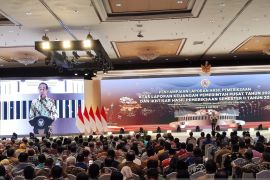"Indonesia`s economy has grown well in the past few years and its next challenge is to push the growth to make it an advanced country with a high income per capita," he noted.
Changyong said Indonesia needs to carry out structural reforms by improving its infrastructure facilities, strengthening government institutional management, boosting investment and spreading development to provide more jobs and access to education.
Efforts must be taken so that the manufacturing, services and agriculture sectors improve and are able to provide more jobs to reduce poverty and inequalities, he added.
"This would require adequate infrastructure, good governance and investment in the educational field," he said.
He said the present situation would only make Indonesia a developing country with an average income; it would not make the country an advanced one with a high income per capita.
Changyong added that Indonesia`s economy would not be able to compete with other low income per capita countries, and it has not had the human resources, technology and infrastructure to achieve the status of an advanced country.
"Many Asian and Latin American countries are facing the same problem; that of a middle-income trap. Indonesia is not an exception," he said.
Changyong said that Indonesia, which has recorded a 5.9 percent growth in the past five years, has had to face this challenge since its investment and manufacturing growth is still slow.
"Challenges are continuing although Indonesia has obtained an investment grade status, while the rate of poverty and unemployment has also declined," he remarked.
Meanwhile, Indonesia`s minister of national development planning, Armida S Alisjahbana, said that the government needs to be consistent in developing institutions and implementing good governance so that it could become an advanced country.
"Corruption and decentralization still remain hot issues and the government must be consistent in dealing with them so that Indonesia does not fall into a middle-income trap," she said.
Apart from that, she said, empowerment of women and the youth is also important to promote quality economic growth.
"The role of women and young people in all aspects is very important because future economic growth will not be realized without them," she said.(*)
Editor: Heru Purwanto
Copyright © ANTARA 2012











